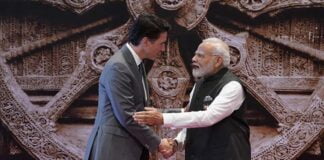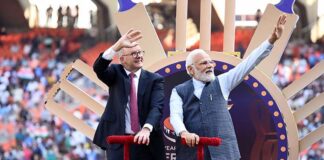Prime Minister Narendra Modi is on track to win India’s upcoming election, giving him a third term in office and allowing him to cement his reactionary and racist agenda.
Almost 970 million Indians head to the polls from 19 April in an election that runs for six weeks.
An opinion poll published on 3 April shows that Modi’s National Democratic Alliance coalition could win 399 of the 543 seats in the lower house while his Bharatiya Janata Party (BJP) alone is projected to win 342.
The main opposition party is the Indian National Congress, which governed India from 1952 to 1989 with just a three-year break. The poll indicates it will win a record low of 38 seats. Overall, the opposition coalition is on track for just 94 seats.
Modi’s politics are those of Islamophobia and authoritarianism.
His political roots emerged from the far-right, Hindu nationalist Rashtriya Swayamsevak Sangh (RSS), meaning National Volunteers Order.
Modi has built his career by deliberately stoking communalism—targeting Muslims as an “enemy within”.
In 2002, as governor of the province of Gujarat, Modi allowed racist thugs to rampage through Muslim areas and kill more than 2000 people.
As prime minister, he has supported a program of conversion to Hinduism, fomented hatred against so-called “love jihad” relationships between Muslims and Hindus, and passed a law that offers a path to Indian citizenship for persecuted religious minorities in Afghanistan, Bangladesh and Pakistan—but not for Muslims.
This could be used to deport thousands of Muslims, the majority of those who have fled to India seeking protection, such as Rohingyas from Bangladesh and Afghan Hazaras.
Underpinning all this is the concept of Hindutva (“Hindu-ness”), the idea that the only authentic expression of India is Hindu in nature and origin and that the Hindu majority should impose its will on the rest of society.
Modi’s BJP has long been associated with a sometimes bloody campaign to build a Hindu temple at Ayodhya in the northern state of Uttar Pradesh on land long used for a mosque.
In January, Modi turned the consecration of the new temple into a massive national event, underscoring the way that India is increasingly becoming a Hindu supremacist society.
There was little mainstream dissent—Modi has muzzled the media and used the courts to crush opponents.
Bonanza
Modi is committed to building Indian capitalism. He has presided over cuts to welfare spending, privatisation and restrictions on unions, while cutting corporate taxes and abolishing wealth tax. The result has been a sharp increase in inequality.
For some Indians, his rule has been a bonanza. Since Modi first came to office in 2014, the value of India’s stock market has trebled and India’s economy has almost doubled.
Oxfam reports that there are 119 billionaires in India. Between 2018 and 2022, India was estimated to be producing 70 new millionaires every day. Yet 90 per cent of the population gets by on less, often much less, than $5300 a year.
Modi has kept the support of many of the poor, however, through a combination of Hindu chauvinism and highly subsidised food and cooking gas.
He has also presided over an infrastructure expansion that includes LED lights in villages and cheap phones and mobile data. He argues that building highways and airports shows that India is becoming a modern power.
Encircling China
A Modi win will be greeted by Anthony Albanese, who has gone out of his way to associate himself with the Indian leader.
Partly this is about Labor chasing votes among migrants. But it also reflects the fact that India is part of the Quad, an alliance with Australia, the US and Japan which is aimed at encircling China.
It will also be greeted by Israeli Prime Minister Benjamin Netanyahu. In 2017, Modi became the first Indian prime minister to visit Israel. He was one of the first global leaders to support Israel after 7 October.
Modi and Netanyahu share a commitment to ethnonationalism and religious supremacism, along with rampant Islamophobia.
The links are economic, too. Israel is in the process of recruiting 20,000 Indian workers. The Indian business giant Adani has bought the Israeli port of Haifa.
The two countries are also involved in plans, delayed by the Gaza crisis, to establish a rail and shipping corridor from India to the UAE, Saudi Arabia, Israel, Jordan and Europe.
Modi may look all-powerful but he continues to face opposition from below.
In 2020, about 250 million Indian workers took part in a one-day general strike.
And hundreds of thousands of farmers protested against laws that would strengthen big agriculture companies—and won.
The future of India will not be settled at the ballot box but in struggle, on the streets and in the workplaces.
By David Glanz






